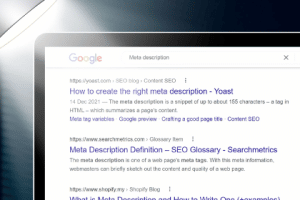People use search engines to find what they’re looking for on the internet. Search engines are a frequent starting place when you need information, whether you’re studying a product, looking for a restaurant, or planning a vacation. They provide fantastic levels of chance for business owners to send relevant traffic to your website.
What is Digital Marketing?
The use of digital channels to promote products and services to consumers is referred to as digital marketing. Websites, mobile devices, social media, search engines, and other comparable channels are used in this sort of marketing. With the introduction of the internet in the 1990s, it grew in popularity. It employs some of the same ideas as traditional marketing and is frequently regarded as a novel technique for businesses to approach consumers and comprehend their behavior. Companies’ plans frequently blend traditional and online marketing tactics.
Marketing encompasses all of the operations that a firm engages in to advertise its products and services and increase its market share. Marketing involves a combination of advertising acumen, sales, and the capacity to deliver items to end consumers to be effective. This is typically carried out by specific professionals or marketers who can operate both insides (for corporations) and externally with other marketing firms. Traditionally, firms focused on print, television, and radio marketing. Although these choices are still available today, the development of the internet caused a shift in how businesses communicate with their customers. This is where online marketing comes in. This type of marketing makes use of websites, social media, search engines, apps, and anything else that combines marketing with consumer feedback or a two-way contact between the firm and the customer.
Companies were obliged to modify their marketing approaches as technology advanced and new trends emerged. In the early days of online marketing, email was a prominent marketing technique. That emphasis moved to search engines like Netscape, which enabled firms to tag and keyword material to get found. Companies may now track data to respond to customer trends thanks to the emergence of social networking sites such as Facebook. Increased technology and innovative trends compelled businesses to alter their marketing approaches. Email was a prominent marketing strategy in the early days of online marketing. This attention switched to search engines like Netscape, which enabled firms to tag and keyword material to get found. The development of social networking sites such as Facebook enabled businesses to track data to respond to customer patterns.
Why it is Important?
Times have changed, and so has the way businesses approach their clients. Traditional marketing has stepped back to allow a fresh face to enter the sector. Digital marketing is significant since it connects a company to its customers when they are online and is effective in many industries. It links businesses with ideal clients on Google via SEO and PPC, on social media via social media marketing, and email marketing.
What is Search Engine Optimization (SEO)?
SEO stands for “search engine optimization,” and it refers to the process of optimizing your website to boost its exposure when people search for items or services connected to your company on Google, Bing, and other search engines. The higher your pages optimize and appear in search results, the more likely you are to attract attention and attract new and existing clients to your business. SEO has two primary objectives. The first is to help you understand what users are looking for online so you can generate high-quality content to meet their needs. The second is to assist you in developing a website that search engines can find, index, and comprehend.
Furthermore, adhering to proper SEO approaches is an excellent approach to improving the quality of a website by making it more user-friendly, faster, and easier to navigate. The most critical SEO duties are as follows:
- Determining what users are looking for about your products and services;
- Creating content that will please users;
- Providing the right signals to search engine crawlers and algorithms through various SEO techniques.
SEO can be thought of as a full framework because the entire process has a set of rules (or guidelines), stages, and controls. Simply put, Search Engine Optimization is a method of improving your website so that it appears at the top of Google, Yahoo, Bing, and other search engine rankings. When you make a Google search, the order in which the returned results are displayed is determined by complicated algorithms.
Before deciding which webpage will be shown in the first, second, or third place, these algorithms (also known as search engine ranking factors) consider a variety of rules. Search engine optimization gives you an advantage over non-optimized sites and increases your chances of ranking higher.
Importance of SEO
SEO marketing is more vital than ever in today’s competitive market. Every day, millions of people use search engines to find answers to their inquiries or solutions to their issues. SEO can help you acquire free targeted traffic from search engines if you have a website, blog, or online store. SEO is essential because:
- The majority of search engine users are more to click on one of the top five suggestions on search engine results pages (SERPS). To capitalize on this and get visits or consumers to your online store, your website must appear in one of the top rankings.
- SEO is considerably more than just search engines; strong SEO tactics increase a website’s user experience and usability.
- Users trust search engines and having a presence in the top places for the keywords the user is searching for builds trust in the website.
- SEO is beneficial to the social advertising of your website. People who find your website through a Google or Bing search are more inclined to share it on Facebook, Twitter, or other social media platforms.
- SEO is critical for the proper operation of a large website. SEO can assist websites with several authors in both direct and indirect ways. Their immediate benefit is increased organic traffic, and their indirect value is having a standardized framework (checklists) to employ before posting content on the site.
- SEO might help you get a leg up on the competition. If two websites sell the same product, the search engine optimized website will have more customers and earn more sales.
How do Search Engines work?
So, how do search engines work? Search engines return results for any search term entered by the user based on the search engine algorithms. To accomplish this, they examine and “understand” the massive network of website results that comprise the internet. They use a complex algorithm to choose which search results to show for each search query. Using their web crawlers, search engines crawl hundreds of billions of pages. These web crawlers are also known as search engine bots or spiders. A search engine navigates the web by downloading web pages and following links on these pages to discover new pages that have been made available.
Bots are used by search engines such as Google and Bing to crawl websites, moving from site to site, collecting information about those pages, and indexing them. Following that, algorithms analyze pages in the index, taking hundreds of ranking variables or signals into consideration, to determine the order in which pages should appear in search results for a given query. Unlike sponsored search ads, you cannot pay search engines to improve your organic search rankings, therefore SEO experts must put in the effort. The search algorithms are intended to surface relevant, authoritative pages while still providing users with an efficient search experience. Keeping these criteria in mind while optimizing your site and content will help your pages rank higher in search results.
Rankings
This is how search engines select where to place a specific web page in the SERP. Rankings range from zero to the total number of search engine results for the query, and a web page can only rank for one position at a time. A web page’s rating may change over time owing to age, competition in the SERP, or algorithm changes made by the search engine itself.
Visibility
This refers to how visible a specific domain is in search results. Lower search visibility occurs when a domain is not visible for a large number of relevant search queries, whereas higher search visibility is the reverse.
Crucial Elements of SEO
Many people are looking for items. Not just because there is a lot of traffic, but also because there is a lot of very precise, high-intent traffic, that traffic can be quite strong for a business. Consider the following elements to optimize search engine SEO:
Keywords
SEO is not about increasing the number of visits to a website. You want to attract folks who need what you’re selling and can turn into leads and, eventually, consumers. That is only conceivable if it ranks for the terms that those folks would use when searching. There’s no way they’d ever discover you otherwise. Even if your website showed near the top of the search results. As a result, SEO work begins with determining what phrases potential consumers enter into search engines. Identifying terms and subjects important to your organization is usually the first step in the process. Then, converting them into initial keywords. And finally, conduct extensive research to uncover related terms your audience would use.
Keywords are no longer the only SEO approach that matters, but that doesn’t mean they aren’t still important. The difference today is that keywords must be well-researched, carefully chosen, and used sparingly in your content to be effective. But what precisely are keywords? Keywords are terms and phrases that prospects use to access online material, which brands may then use to interact with prospects who are interested in their products and services. When deciding which keywords to target on your website, there are numerous important variables to consider:
Search Volume
- The first thing to evaluate is how many people are searching for a specific keyword. The more individuals that search for a keyword, the larger the potential audience you have. In contrast, if no one is searching for a keyword, there will be no audience to find your material through search.
Relevance
- Just because a term is widely searched for does not guarantee it is relevant to your prospects. Keyword relevance, or the relationship between a site’s content and the user’s search query, is an important ranking signal.
Competition
- Keywords with a high search volume might generate a lot of traffic, but competition for premium placement on search engine results pages can be fierce.
Content
Content is essential in SEO since it is the vehicle via which you reach and engage people. Knowing your angle and creating content that meets the bill is critical. When you use a search engine, you’re seeking material — for example, information on a specific issue or problem. True, this content may be available in a variety of formats. Text, such as a blog post or a web page, could be used. However, it might also be a video, product recommendation, or company directory. It’s all about the content. And it’s what helps SEO acquire more search prominence.
Content must be instructive, but also fascinating, current, and shareable in today’s world. Content can take several forms, including:
- Website content
- Videos
- Blogs (it’s simple to set up your blog for practice!)
- Infographics
Podcasts - Listicles
- How-to manuals
- E-books and whitepapers
- Posts on social media
- Listings
Off-Page SEO
Off-page SEO refers to external optimization efforts that take place outside of your website rather than on it. Backlink building is the most important off-page SEO approach since excellent backlinks to your site from external sites signal search engines that your site is valuable and of high quality, which helps to develop authority. Backlink-building tactics vary, but some current best practices include guest blogging, developing a large number of infographics that will be widely shared, and incorporating influencer marketing into your content.
Local SEO
Local SEO is becoming increasingly crucial as more people search using mobile devices. Nowadays, the majority of searches are conducted on mobile devices, with approximately half of those searches having a local intent. Other local SEO best practices, in addition to employing local keywords, include claiming directory listings, establishing location-specific pages for your site, and generating pages for your business (also known as doorway pages) on Google My Business local directories and Google Maps.
Search Engine Marketing
Search Engine Marketing (SEM) encompasses paid marketing activities such as native ads, Google AdWords, social media ads, pay-per-click (PPC), Google shopping ads, display ads, and more. Although SEM isn’t necessarily a necessary component of a comprehensive SEO strategy, it can help you reach new and highly targeted consumers. You may also make SEO and SEM work in tandem. SEM advertising efforts include the following:
- Campaigns that are paid and targeted
- Copy based on keywords that is specific to your company or product
- Click-through rates (CTR) and cost-per-click (CPC) are two performance measures.
Title Tags
While Google is attempting to better grasp the true meaning of a page and de-emphasizing (and even punishing) aggressive and manipulative keyword use, adding the term (and related phrases) that you want to rank for in your pages is still beneficial. And the title tag of your website is the single most important area to add your keyword. The title tag is not the major headline for your page. The page’s headline is normally an H1 (or perhaps an H2) HTML element. The title tag appears at the top of your browser and is generated by your page’s source code in a meta tag.
The length of a title tag that Google will display varies (it is based on pixels, not character counts), but 55-60 characters is a decent rule of thumb here. If possible, incorporate your primary keyword, and if you can do so naturally and convincingly, include some related modifiers around that term as well. Remember, the title tag is typically what a searcher sees in search results for your page. Because it is the “headline” in organic search results, you should consider how clickable your title tag is.
Site Meta Descriptions
While the title tag serves as the headline for your search listing, the meta description (another meta HTML element that may be altered in your site’s code but isn’t shown on your actual page) serves as your site’s supplementary ad content. Google takes some liberties with what appears in search results, so your meta description may not always appear, but if you have a captivating description of your page that would entice people looking to click, you can significantly improve traffic.
Significance of SEO in Marketing
Because individuals make trillions of searches each year, frequently with commercial intent to find information about products and services, SEO is a critical component of online marketing. Search is frequently the key source of digital traffic for firms, supplementing other marketing methods. Greater visibility and higher placement in search results than your competitors can have a significant influence on your bottom line. However, search results have evolved in recent years to provide users with more direct answers and information that is more likely to retain people on the results page rather than pushing them to other websites.
Also, elements in the search results such as rich results can boost visibility and give users with more information about your organization directly in the results. To summarize, SEO is the cornerstone of a whole marketing ecosystem. When you understand what your website visitors want, you can use that knowledge in your campaigns (paid and organic), website, social media properties, and more.
How does Google Determine which Pages to Rank in SEO?
Search engines serve a single purpose. They strive to deliver the most relevant answers or information to users on the organic search results. When you utilize them, their algorithms select the sites that are most relevant to your query. Then, sort them by authority or popularity, displaying the most authoritative or popular first. Search engines consider two variables while delivering relevant information to users:
- The relationship between a search query and the content on a page. Search engines evaluate it based on several aspects such as topic or keywords.
- The popularity of a website on the Internet is used to determine authority. Google assumes that the more popular a page or resource is, the more useful its content is to readers.
And to examine all of this data, they employ sophisticated equations known as search algorithms. The algorithms used by search engines are kept private. However, SEOs have recognized some of the elements they examine when ranking a page over time. They are referred to as ranking criteria, and they are the focal point of an SEO campaign.
Following the E-A-T structure when establishing relevance and authority can be extremely beneficial. In SEO, E-A-T stands for “expertise,” “authority,” and “trustworthiness,” and while these are not direct ranking factors, they can improve your SEO data content, which can affect direct ranking factors. As you’ll see in a moment, adding additional content, optimizing image filenames, and strengthening internal links can all have an impact on your rankings and search visibility because each of these actions improves a ranking factor.
Digital Marketing and SEO Strategies with Mach1
An SEO marketing strategy is a complete plan for increasing the number of visitors to your website via search engines. On-page methods that leverage intent-based keywords, as well as off-page strategies that generate inbound connections from other websites, are essential for successful SEO. An SEO strategy is an act of categorizing a website’s content to increase its chances of showing in search results. Essentially, it is the procedure you use to increase your chances of gaining organic traffic from search engines. The importance of digital marketing and SEO strategy is greater than ever. Take action now to direct, create, streamline, or enhance your marketing plan to increase your outcomes in the following year. Begin your professional adventure with Mach1 today. Speak to one of the SEO & Content Marketing Experts at Mach 1 Design today and let us increase your leads from SEO by up to 300% in 6 months! Call Harold @ (469) 536-8478 or email Harold@Mach1websites.com.





